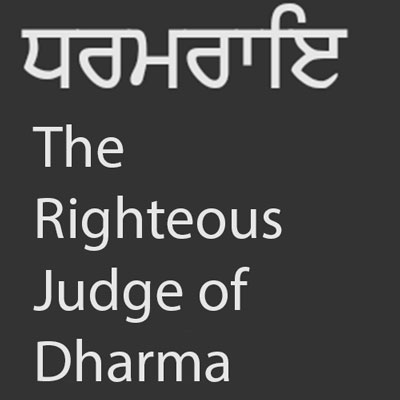I was recently watching a kirtan program by Sant Waryam Singh Ji, entitled Sakhi Bhai Bhoru. At about 14 minutes in, Sant Maharaj Ji talks about what happens after death, reading the below lines from gurbani (SGGS, page 38).
I asked Baba Gurpal Singh Ji specifically for the meaning of these lines. I translated his explanation from Punjabi into English:
The Dharam Raj (judge) is ordered by Akal Purkh (God) to administer justice according to true religion. Those who give others pain in order to make themselves more comfortable, those who don’t love God and instead love others, you are under his command.
What does it mean to administer justice according to true religion? In other words, the Dharam Raj is ordered to judge everyone fairly, according to the laws that are set by God. There is no room for outside influence, bribery, etc. If someone commits x sin, then the laws state that he will get y punishment, and the Dharam Raj must sentence the person accordingly.
The Dharam Raj employs the services of the chitr gupt, who Sant Waryam Singh Ji likens to secret photographers. They take records of whatever people do in the physical world and present it when someone is in the court of the Dharam Raj.
Where is the Dharam Raj? The world we see is referred to as something that is asthool, or physical. In this Asthool solar system, our closest neighbor is the moon. However, there are invisible places that are referred to as something that is sukhsham, or astral. The closest sukhsham place to us is the court of the Dharam Raj; it’s also called Dharam Khand. The Dharam Raj’s agents come to get you when your physical body dies. Your suksham body is what goes to Dharam Khand. Which agents come to get you depends on you. If you’re the type of person who is likely going to qualify to go to hell, for example, then you get dragged by the jamdoot. They have frightening countenances and the crack of their whip cannot be tolerated.
Other people, if their deeds qualify them, will be escorted after death by much nicer agents. For example, you may be a believer in God, did some prayers regularly, didn’t purposefully commit sins and did a few good deeds.
Still, both categories of people end up going to the Dharam Raj. The former have further problems when they are judged, while the latter are treated with respect. All are judged according to their deeds. Some go to hell for their sins, others suffer through the brutal cycle of 8.4 million life forms (we currently have the most valuable human birth). Yet others go to one of the heavens, but even there, time is limited according to how many good deeds you did. Even those in the heavens eventually have to return to the physical world; the cycle of birth and death isn’t ended.
There is one exception to the rule where all people, whether righteous or wicked, go to the Dharam Raj to be judged. Those who belong to a Guru, instead of going to the court of the Dharam Raj, go to the court of their Guru. In Sikhism, this means those who have taken amrit and live according to gurmat go to Guru Nanak’s court.




0 Comments